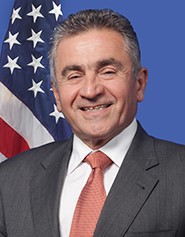NBAA and NATA expressed their appreciation to FAA Associate Administrator for Aviation Safety Ali Bahrami for his decades-long service at the agency. Bahrami recently announced his retirement, effective June 30.

In particular, NBAA applauded Bahrami’s unique focus on pioneering risk-based safety programs. His perspectives have been especially valuable in providing informed, yet nimble responses to the sector’s challenges in facing the COVID-19 pandemic.
“Ali’s tireless leadership and constant focus on continued improvement and innovation in safety thinking has undoubtedly made aviation safer,” said Doug Carr, NBAA’s senior vice president of safety, security, sustainability and international operations. “While providing critical guidance in this pandemic year, he has kept his eye on the horizon, with his unwavering support for data-driven programs such as ASIAS [Aviation Safety Information Analysis and Sharing system], and other programs to ensure that risks to safety are data-driven, analyzed and shared.
“NATA, on behalf of its Board and members, congratulate Ali Bahrami on his many years of service to the FAA and achievements as Associate Administrator for Aviation Safety. We are truly appreciative of his willingness to listen to and work with the industry in advancing key initiatives as well as his steady leadership in the most challenging of times,” stated NATA President and CEO Timothy Obitts.
Barhami served at the FAA for almost 28 years, joining the agency in 1989 as an engineer, and eventually serving as manager of the Transport Airplane Directorate for almost a decade. He joined the Aerospace Industries Association in 2013 before returning to the FAA in his current role in 2017.
“Under Bahrami’s guidance, the FAA Aviation Safety organization became more agile, consistent, and better positioned for the future through strategic planning and collaborative engagements to advance integration of new and emerging technologies. Bahrami stood by flexibility, innovation, proactive methods, and collaboration between government and industry as keys to success for continuous safety improvement – methodology that would serve the FAA and industry well as we worked together to continue safe and efficient essential operations throughout the pandemic. We wish him all the best,” added NATA Vice President of Regulatory Affairs John McGraw.



